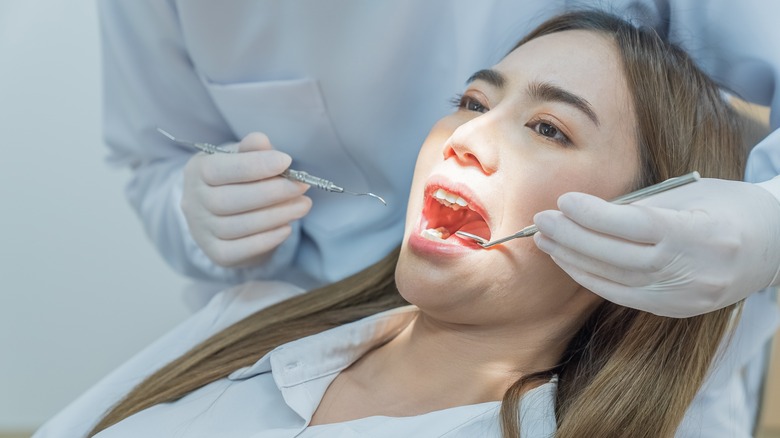Gums are a crucial part of the oral cavity and play an essential role in maintaining good oral health. They surround and support the teeth, providing a seal around each tooth that helps protect the underlying bone and connective tissue to prevent bacteria and other mouth-related diseases (via Much Hadham Dental Care). Indeed, gums also play a vital role in overall health, and good oral hygiene practices, such as regular brushing and flossing, can help prevent tooth decay and gum disease, which are common dental conditions that can lead to tooth loss and other complications.
Interestingly, there is a strong link between oral health and systemic health, per the FDI World Dental Federation. Poor oral health has been associated with various health conditions, such as cardiovascular disease, diabetes, and retinopathy. In some cases, a bump on your gums could indicate an underlying condition. Therefore, it is important to understand the possible causes to ensure you seek prompt treatment.
What causes a bump in the gums?

The bump on your gums can be traced to several causes, including canker sores, gingivitis, and dental abscesses. Canker sores, for starters, are small, painful ulcers that can develop on the gums or other soft tissues in the mouth, according to the Mayo Clinic. They can be quite uncomfortable, making it difficult to eat or talk. Their exact cause is unknown, but they are thought to be related to various factors, such as injury to the mouth, consumption of certain foods, and various underlying medical conditions. The good news is that they typically vanish within a week or two.
Gingivitis, on the other hand, is a common gum disease that causes inflammation and bleeding of the gums. In fact, a 2024 study published in Head and Neck Pathology found that various types of lesions were associated with gingivitis. Unfortunately, if left untreated, gingivitis can progress to more issues, like tooth loss and periodontitis, says the Mayo Clinic.
And as for dental abscesses, they are pus-filled sacs that can form at the root of a tooth or on the gums, per WebMD. Dental abscesses can cause significant pain and discomfort and require prompt treatment to prevent the infection from spreading.
More serious conditions

In rare cases, a bump on the gums may be a sign of oral cancer, explain the experts at Healthline. Mouth cancer, also known as oral cancer, can arise in various parts of the mouth, including the tongue, mouth lining, lips, gums, as well as the back of the throat. Common symptoms of mouth cancer include loose teeth, a sore that won’t heal, difficulty swallowing, and growth or bump in the mouth. The experts at World Cancer Research Fund International found oral cancer more common in people who smoke tobacco and drink alcohol or do both.
If you notice a bump in your gums, schedule an appointment with your dentist as soon as possible. After all, your dentist can examine the bump and determine the underlying cause. And depending on the cause, your dentist may recommend treatment such as medication, a dental procedure, or a referral to a specialist.



